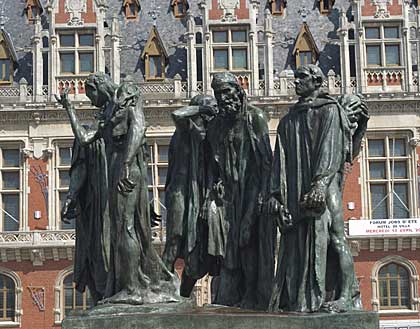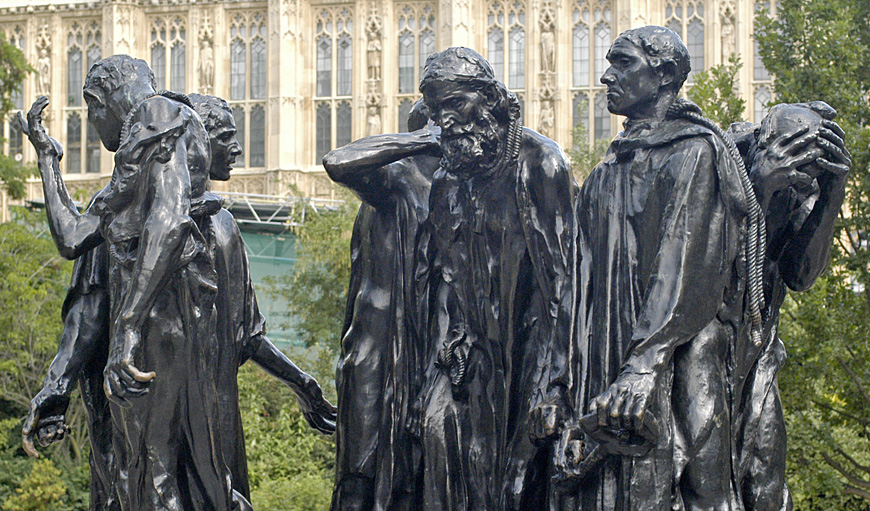THE BURGHERS OF CALAIS
In 1347 the French port of Calais was captured by the army of the king of England, Edward the Third, after a year-long siege. Calais was important to the English, not only because of its position just across the English channel, but because it had been a base for French pirates who made regular raids on the English. King Edward hated Calais and its citizens.
The siege had left the people of Calais starving to death, and the French army could not get close enough to the city to try to rescue them: the marshy land and the presence of English troops made that impossible.
In desperation the governor of Calais, Jean le Vienne, asked to parley with the enemy. King Edward sent two of his barons to hear what he offered. The governor told them how the people were dying of hunger, and asked that the citizens be allowed to leave the city in order to survive. Then the English troops could occupy it and its castle.
The barons went back and told Edward about Jean le Vienne's proposal, but he would have none of it: Calais must surrender unconditionally, and that was that.
The barons tactfully pointed out that the king might find it wise to set an example of mercy: if he did not, there might be retaliation by enemies in the future, with no mercy showed to English citizens.
Edward gave this some thought and made a decision. "You can tell the governor of Calais that six of its chief citizens must walk barefoot from the town to my camp, with rope halters round their necks and the keys to the city and the castle in their hands. On them," he said darkly, "will do my will. The rest of the citizens will be pardoned."
Jean le Vienne ordered the city bell to be rung, and when they heard it the people gathered at the city centre to hear what they hoped would be good news. But when they heard what the king had decreed, they were soon groaning and weeping in despair.
Then one of the chief burgesses of Calais stepped forward. His name was Eustace de St. Pierre. He said he was prepared to give himself up to the English king, and was happy to do this and so save the citizens of Calais. One after the other, five more men joined him. Barefoot, and with ropes round their necks, they set out on the painful walk to the king's tent. Edward was waiting for them, and with him was his much-loved wife, Philippa.
The six burghers of Calais knelt before the king and queen. Then Eustace de St. Pierre said: "We are six men of the old bourgeoisie of Calais, and we bring you the keys of the city and the castle. We entreat you to show compassion to our suffering townsfolk." Many of the English lords present shed tears of pity and of respect for the men's bravery as they listened.
But king Edward was still angry with Calais, which had cost him so much in English lives and money, and ordered that the six men were to be beheaded at once.
 One of the barons who had talked with the governor of Calais now came forward. "Sire, you have a reputation for being noble and generous. I urge you to restrain your anger and not tarnish your reputation for fairness by a vengeful act of cruelty." One of the barons who had talked with the governor of Calais now came forward. "Sire, you have a reputation for being noble and generous. I urge you to restrain your anger and not tarnish your reputation for fairness by a vengeful act of cruelty."
The king would not listen, but called for the executioner to come with his axe. "The people of Calais have caused the death of so many of my men, now these men must die."
Queen Philippa came closer to her husband. She was expecting a baby very soon, but despite the bulk of her pregnancy she dropped on her knees in front of the king. "My lord," she said, ‚"risked great danger by sailing from England to be with you, and have asked for nothing in return. Now I humbly ask for one gift: for God's sake, and for the sake of your love for me, be merciful!" And she too broke down in tears.
The king looked down at her in silence for a long time. Then he said, "I could say I wish that you had not been here! Then I would not have had to listen to a request I cannot refuse. I give these six burghers of Calais into your care: do what you like with them."
Queen Philippa led the six men to her own part of the camp. Here her attendants took the rope halters from their necks, provided clean clothing, and made them a good meal. The queen then gave them some money and saw that Eustace de St Pierre and his friends were escorted safely out of the camp and back to Calais.
From time to time after that the English and French tried to make treaties and peace agreements. Sometimes they were successful, but the truces did not last. The Hundred Years War did not end until 1453 - and, some say, not even then. They name the year 1558, when the English were finally forced out of Calais for good.
|


